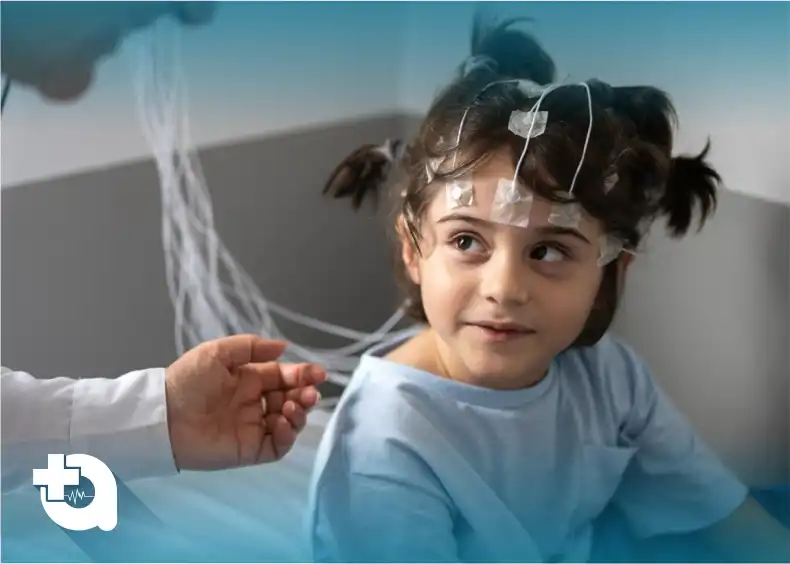Paediatric Neurology
Specialty > Subspecialty > Paediatric Neurology


Paediatric neurological treatments are complex and require expert supervision. Owing to the criticality involved, it is important to have experts that are highly experienced and capable of performing the surgery with complete precision.
The Department of Paediatrics at Aayush Hospitals provides comprehensive paediatric care, including diagnostic tests and treatments. With advanced facilities for paediatric medicine and surgery, our hospital can perform complete diagnosis and treatment of various paediatric conditions.
Our team includes paediatricians, doctors, and nurses with years of expertise in the field. Moreover, our team provides a multidisciplinary approach to create customized and patient-centric treatment plan.
Equipped with state-of-the-art infrastructure, Aayush Hospitals is one of the best hospitals in Gujarat for paediatrics.

Computed tomography or CT scan is an imaging test similar to an X-ray that shows structures inside your body. Unlike an X-ray, a CT scan takes dozens of images of your body.
What Does a CT Scan Show?
A CT scan can show images of your:
Bones.
Organs.
Muscles.
Blood vessels.
What Can CT Scan Detect?
Your CT scan can detect several injuries and diseases including:
Benign cancer.
Fractures.
Heart diseases.
Blood clots.
Brain injuries.
Spinal cord injuries.
Internal bleeding.
What Happens During CT scan?
During the scan, you will lie on your back on a table. If needed, your doctor may also inject a contrast die into your vie. This dye may make you feel flushed. During the scan:
The bed will slowly move into a circular scanner. You will be required to stay as still as possible during this phase to avoid the blurring of images.
You may also be asked to hold your breath for around 15-20 seconds.
The scanner will take pictures of your body.
Once done, the table will move back to its original position.
What Are the Side Effects of CT Scan?
A CT scan is generally safe. It may, however, cause:
Headaches.
Dizziness.
Nausea and vomiting.
Lumbar puncture is also a diagnostic procedure during which your doctor inserts a needle into your lower back to remove a sample of cerebrospinal fluid. This test helps in diagnosing conditions affecting the brain, nerves, and spinal cord.
Why Do You Need a Lumbar Puncture?
A lumbar puncture is required to detect:
Dementia.
Leukaemia.
Meningitis.
Encephalitis.
Multiple sclerosis.
Myelitis.
What Happens During a Lumbar Puncture?
During the lumbar puncture:
You will lie on your left side and pull your knees to your chest.
The doctor will clean your skin and numb the area of your lower back.
Once anaesthesia hits, the doctor will insert a thin, hollow needle in between two vertebrae.
The needle will move in the area between your spinal cord and meninges.
The doctor will measure spinal fluid pressure and remove a sample of cerebrospinal fluid.
The doctor will pull the needle out and put a bandage on the skin.
What Are the Risks Associated with a Lumbar Puncture?
It has been observed that around 10% of people who get lumbar punctures develop a spinal headache. Apart from this, it may also cause:
Fast heart rate.
Low blood pressure.
Nausea.
Infection.
Swelling.
Bleeding.
Lower back pain.
Neurodevelopmental disorders refer to impaired growth of the brain and nervous system. This results in various emotional, physiological, psychological, and neurological disturbances in a child.
A neurodevelopment assessment focuses on the overall growth and development of a child by analyzing both his strengths and weaknesses.
What Are Neurodevelopment Tests and Examinations?
A neurodevelopment test may differ for every child. In general, these tests may include:
Blood test.
Hearing test.
Physical examination.
Questionnaire.
What is Included in Neurodevelopment Assessment?
A neurodevelopment assessment occurs in many sessions with the paediatrician. It helps your paediatrician to understand the detailed medical history of your child, understand the possible causes, and provide proper treatment options.
Various paediatricians from different disciplines including clinical psychologists, speech therapists, and occupational therapists work together for an overall assessment of your child.
After these assessments, the paediatrician will discuss the results with a treatment plan if your child is diagnosed with a health issue.